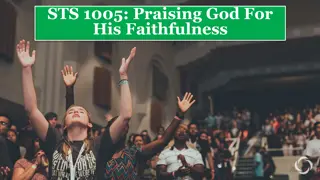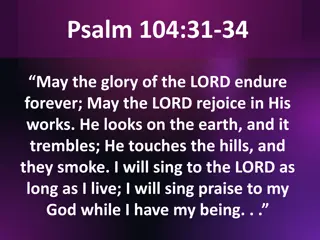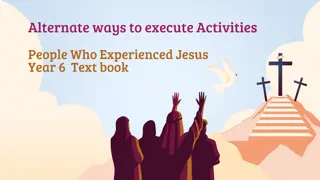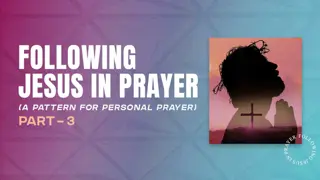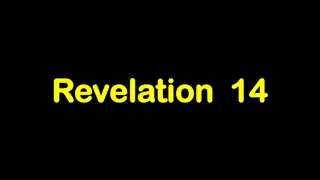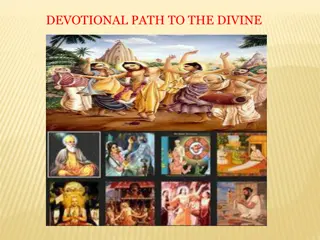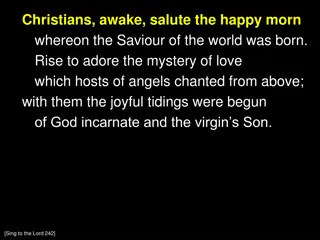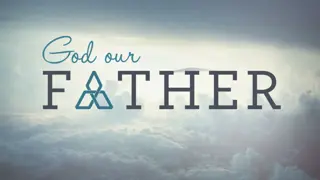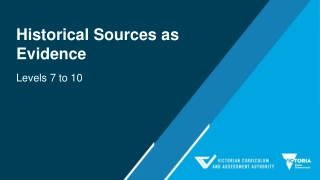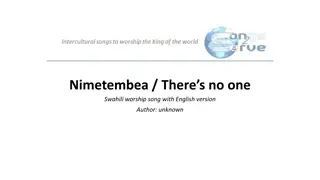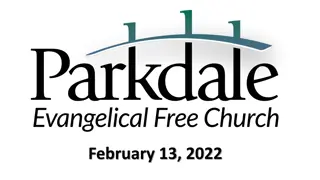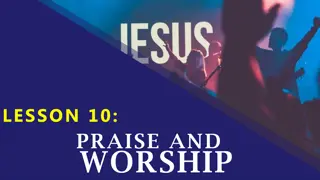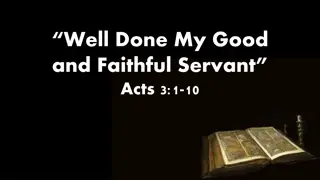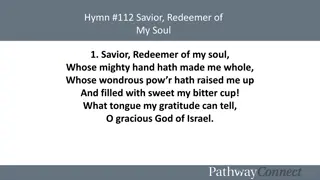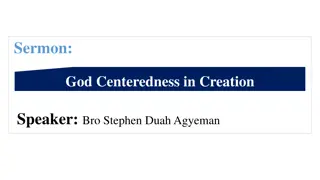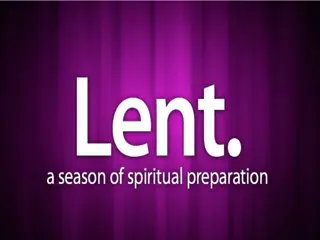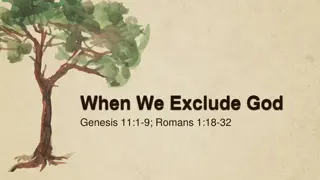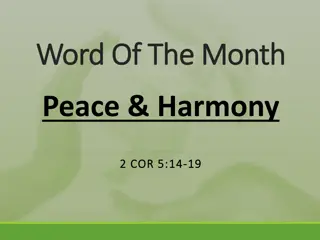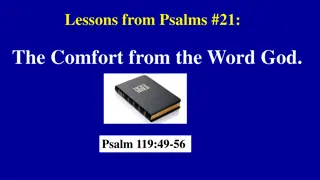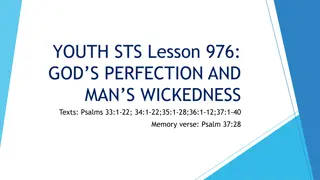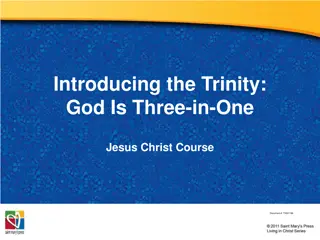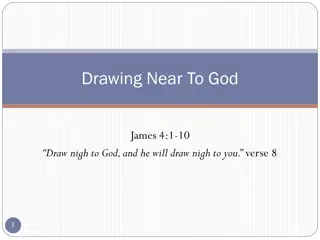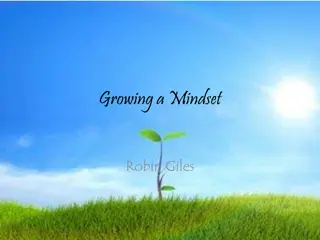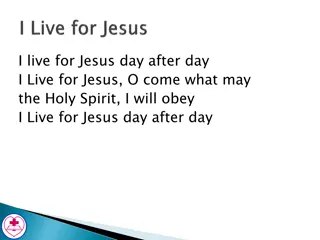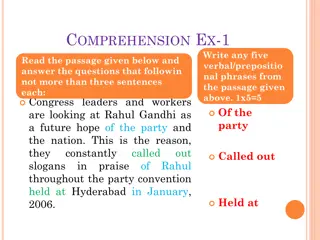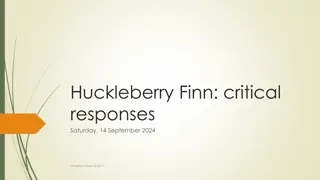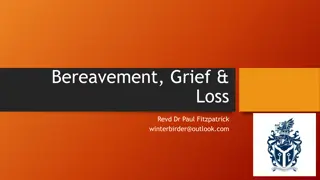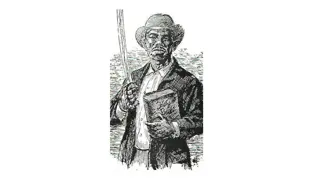Historical Perspectives on Worshiping and Praising God
Explore the historical perspective of worshiping and praising God, tracing back to the origins and evolution of musical instruments in religious worship. Discover insights from notable scholars and influential religious leaders, alongside reflections on the use of instruments in the Old Testament, particularly in David's Psalms.
Download Presentation

Please find below an Image/Link to download the presentation.
The content on the website is provided AS IS for your information and personal use only. It may not be sold, licensed, or shared on other websites without obtaining consent from the author. Download presentation by click this link. If you encounter any issues during the download, it is possible that the publisher has removed the file from their server.
E N D
Presentation Transcript
Pt 3 Worshiping And Praising God Worship & Praise To God
Worshiping And Praising God Historical perspective Origin & History No record of their use in any New Testament church during the entire apostolic period. Up to and during the periods from the death of the apostles to the 5th century, the only historical references are denunciations of their use. The 1st sanctioned appearances of their use in worship came around the 6th century.
Worshiping And Praising God Historical perspective The words of notable scholars Dr. Fredrick Louis Ritter, History of Music from the Christian Era to the Present Time, page 28, We have no real knowledge of the exact character of the music which formed a part of the religious devotion of the first Christian congregations. It was, however, purely vocal. Lyman Coleman, Presbyterian scholar and author makes the following statement in his book, The Primitive Church, page 370- 371, 376-377, Both the Jews in their temple service, and the Greeks in their idol worship, were accustomed to singing with the accompaniment of instrumental music. The converts to Christianity, accordingly, must have been familiar with this mode of singing but it is generally admitted, that the primitive Christians employed no instrumental music in their religious worship Such musical accompaniments introduced but can hardly be assigned to a period before the 5th and 6th centuries. were gradually Lyman Coleman
Worshiping And Praising God Historical perspective The witness of influential religious leaders I have no objection to instruments of music in our chapels as long as they are not heard or seen. John Wesley Called the organ an ensign of baal (Mclintock & Strong s Encyclopedia, pg 196) Martin Luther
Worshiping And Praising God Their Use In The Old Testament David s use of mechanical instruments in worship in the Psalms (Psa 150:3-6) Praise him with the sound of the trumpet: praise him with the psaltery and harp. Praise him with the timbrel and dance: praise him with stringed instruments and organs. Praise him upon the loud cymbals: praise him upon the high sounding cymbals. Let every thing that hath breath praise the LORD. Praise ye the LORD. (Psalm 150:3 6 KJV)
Worshiping And Praising God Their Use In The Old Testament David s use of mechanical instruments in worship in the Psalms (Psa 150:3-6) Thou hast caused men to ride over our heads; we went through fire and through water: but thou broughtest us out into a wealthy place. I will go into thy house with burnt offerings: I will pay thee my vows, Which my lips have uttered, and my mouth hath spoken, when I was in trouble. I will offer unto thee burnt sacrifices of fatlings, with the incense of rams; I will offer bullocks with goats. Selah. (Psalm 66:12 15 KJV)
And the priests killed them, and they made reconciliation with their blood upon the altar, to make an atonement for all Israel: for the king commanded that the burnt offering and the sin offering should be made for all Israel. And he set the Levites in the house of the LORD with cymbals, with psalteries, and with harps, according to the commandment of David, and of Gad the king s seer, and Nathan the prophet: for so was the commandment of the LORD by his prophets. And the Levites stood with the instruments of David, and the priests with the trumpets. And Hezekiah commanded to offer the burnt offering upon the altar. And when the burnt offering began, the song of the LORD began also with the trumpets, and with the instruments ordained by David king of Israel. And all the congregation worshipped, and the singers sang, and the trumpeters sounded: and all this continued until the burnt offering was finished. And when they had made an end of offering, the king and all that were present with him bowed themselves, and worshipped. (2 Chronicles 29:24 29 KJV)
And the priests attended to their services; the Levites also with instruments of the music of the LORD, which King David had made to praise the LORD, saying, For His mercy endures forever, whenever David offered praise by their ministry. The priests sounded trumpets opposite them, while all Israel stood. Furthermore Solomon consecrated the middle of the court that was in front of the house of the LORD; for there he offered burnt offerings and the fat of the peace offerings, because the bronze altar which Solomon had made was not able to receive the burnt offerings, the grain offerings, and the fat. (2 Chronicles 7:6 7 NKJV)
Noah (Gen 6:14) Commandment Aid Addition Make Ark with Gopher Wood Hammer, Saw Oak, Hickory The Lord s Supper (1 Cor 11:20-26) Scriptural Example Aid Addition Unleavened Bread Table Meat Fruit of the Vine Cup Milk Command To Sing (Eph 5:19; Col 3:16) Commandment Aid Addition Song Books, Notes, Song Leaders Sing Play
Worshiping And Praising God The /psall Argument The Usage of the Greek term The Greek term appears 5 times in the New Testament And that the Gentiles might glorify God for his mercy; as it is written, For this cause I will confess to thee among the Gentiles, and sing unto thy name. (Romans 15:9 KJV) What is it then? I will pray with the spirit, and I will pray with the understanding also: I will sing with the spirit, and I will sing with the understanding also. (1 Corinthians 14:15 KJV) And be not drunk with wine, wherein is excess; but be filled with the Spirit; Speaking to yourselves in psalms and hymns and spiritual songs, singing and making melody in your heart to the Lord; (Ephesians 5:18 19 KJV) Is any among you afflicted? let him pray. Is any merry? let him sing psalms. James 5:13 KJV)
Worshiping And Praising God The /psall Argument The Usage of the Greek term In classical Greek psall referred to the touching of string Aeschylus (525-456 BC), the well-known Greek playwright, used for the plucking of a hair Euripides (480-460 BC) used the term to mean the twanging of a bowstring was also used to reference the twitching of a carpenter s line so that it would leave a mark Plutarch did use the term to refer to the plucking on the strings of an instrument
Worshiping And Praising God The /psall Argument /psall To cause to vibrate by touching, to twang: to touch or strike the chord, to twang the strings of a musical instrument so that they gently vibrate and absolutely, to play on a stringed instrument, to play the harp, etc. Joseph Thayer [citing ancient classical sources; Aristotle, Plutarch, Aratus]. In the N.T. to sing a hymn, to celebrate the praises of God in song Jas 5:13 R.V; Eph 5:19; Rom 15:9 A.V. (Joseph Thayer) To sing songs of praise, with the possible implication of instrumental accompaniment (in the NT often related to the singing of OT psalms) (Louw & Nida) To move by a touch, to twitch; to touch, strike the strings or chords of an instrument; (Mounce Greek Dictionary)
Worshiping And Praising God The /psall Argument The Usage of the Greek term Therefore, one of the main arguments proponents of instrumental music have used, is the appearance of in the New Testament /psall Speaking to yourselves in psalms and hymns and spiritual songs, singing and making melody in your heart to the Lord; (Ephesians 5:19 KJV) And they sung/sang as it were a new song before the throne, and before the four beasts, and the elders: and no man could learn that song but the hundred and forty and four thousand, which were redeemed from the earth. (Revelation 14:3) ado :{ } to utter words in a melodic pattern to sing. Re 14:3. (Louw & Nida)
Worshiping And Praising God The /psall Argument The Usage of the Greek term Therefore, one of the main arguments proponents of instrumental music have used is the appearance of in the New Testament Let the word of Christ dwell in you richly in all wisdom; teaching and admonishing one another in psalms and hymns and spiritual songs, singing with grace in your hearts to the Lord. (Colossians 3:16 KJV) And they sung/sang a new song, saying, Thou art worthy to take the book, and to open the seals thereof: for thou wast slain, and hast redeemed us to God by thy blood out of every kindred, and tongue, and people, and nation (Revelation 5:9) ado :{ } to utter words in a melodic pattern to sing. Re 14:3. (Louw & Nida)
Then sang Moses and the children of Israel this song to God, and spoke, saying, Let us sing to the Lord, for he is very greatly glorified: horse and rider he has thrown into the sea. (Exodus 15:1 LXX-B) ado Then Israel sang this song at the well, Begin to sing of the well; (Numbers 21:17 LXX-B) And Debbora and Barac son of Abineem sang in that day, saying, (Judges 5:1 LXX-B)
And an evil spirit from God was upon Saul, and he was resting in his house, and a spear was in his hand, and David was playing the harp with his hands. (1 Samuel 19:9 LXX-B) And it came to pass when the evil spirit was upon Saul, that David took his harp, and played with his hand: and Saul was refreshed, and it was well with him, and the evil spirit departed from him. (1 Samuel 16:23 LXX-B) ado
Worshiping And Praising God The /psall Argument Paul specified the instrument to be used Speaking to yourselves in psalms and hymns and spiritual songs, singing and making melody in your heart to the Lord (Ephesians 5:19 KJV) By him therefore let us offer the sacrifice of praise to God continually, that is, the fruit of our lips giving thanks to his name. (Hebrews 13:15 KJV) This verse may not be regulated to just singing praises however, it must be accepted that it most certainly includes it!
Worshiping And Praising God The /psall Argument Most who use instrumental music affirm that only allows instrumental music, not that it is required If means to play a stringed instrument in the New Testament, instrumental music is required Is any among you afflicted? let him pray. Is any merry? let him sing psalms. (James 5:13 KJV)
Worshiping And Praising God The /psall Argument Most who use instrumental music affirm that only allows instrumental music, not that it is required If means to play a stringed instrument in the New Testament, instrumental music is required Speaking to yourselves in psalms and hymns and spiritual songs, singing and making melody in your heart to the Lord; (Ephesians 5:19 KJV) What is it then? I will pray with the spirit, and I will pray with the understanding also: I will sing with the spirit, and I will sing with the understanding also. (1 Corinthians 14:15 KJV)
Speaking to yourselves in psalms and hymns and spiritual songs, singing and making melody in your heart to the Lord; (Ephesians 5:19 KJV) Let the word of Christ dwell in you richly in all wisdom; teaching and admonishing one another in psalms and hymns and spiritual songs, singing with grace in your hearts to the Lord. (Colossians 3:16 KJV)
And the priests attended to their services; the Levites also with instruments of the music of the LORD, which King David had made to praise the LORD, saying, For His mercy endures forever, whenever David offered praise by their ministry. The priests sounded trumpets opposite them, while all Israel stood. Furthermore Solomon consecrated the middle of the court that was in front of the house of the LORD; for there he offered burnt offerings and the fat of the peace offerings, because the bronze altar which Solomon had made was not able to receive the burnt offerings, the grain offerings, and the fat. (2 Chronicles 7:6 7 NKJV)
Worshiping And Praising God The /psall Argument symbolic, metaphorical, figurative, representative, emblematic, imagistic, mystical, parabolic, symbolizing The Book of Revelation The Book of Revelation is extremely allegorical And when he had taken the book, the four beasts and four and twenty elders fell down before the Lamb, having every one of them harps, and golden vials full of odours, which are the prayers of saints. (Revelation 5:8 KJV) And I heard a voice from heaven, as the voice of many waters, and as the voice of a great thunder: and I heard the voice of harpers harping with their harps: (Revelation 14:2 KJV) And I saw as it were a sea of glass mingled with fire: and them that had gotten the victory over the beast, and over his image, and over his mark, and over the number of his name, stand on the sea of glass, having the harps of God. (Revelation 15:2 KJV)
Worshiping And Praising God The /psall Argument The Book of Revelation The Book of Revelation is extremely allegorical When He had taken the book, the four living creatures and the twenty- four elders fell down before the Lamb, each one holding a harp and golden bowls full of incense, which are the prayers of the saints. (Revelation 5:8 NAS95) And I heard a voice from heaven, like the sound of many waters and like the sound of loud thunder, and the voice which I heard was like the sound of harpists playing on their harps. (Revelation 14:2 NAS95) And I saw something like a sea of glass mixed with fire, and those who had been victorious over the beast and his image and the number of his name, standing on the sea of glass, holding harps of God. (Revelation 15:2 NAS95)
ado:{} to utter words in a melodic pattern to sing. Re 14:3. (Louw & Nida) And I saw something like a sea of glass mixed with fire, and those who had been victorious over the beast and his image and the number of his name, standing on the sea of glass, holding harps of God. And they sang the song of Moses, the bond-servant of God, and the song of the Lamb, saying, Great and marvelous are Your works, O Lord God, the Almighty; Righteous and true are Your ways, King of the nations! (Revelation 15:2 3 NAS95)
Worshiping And Praising God Worship & Praise To God


